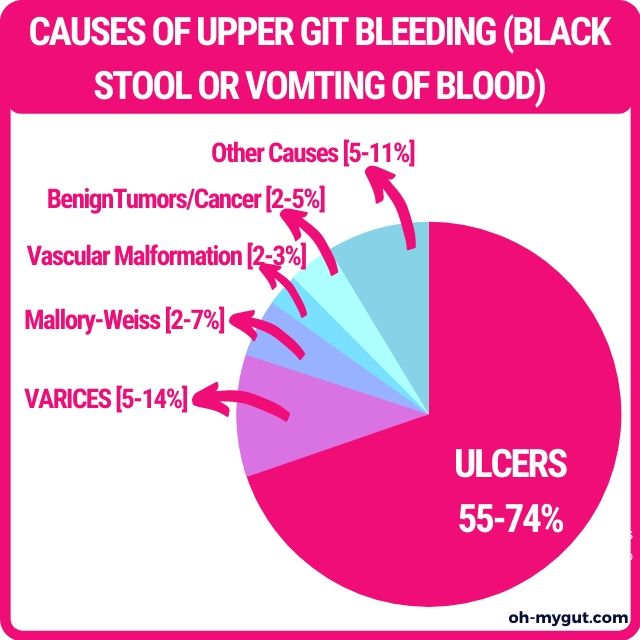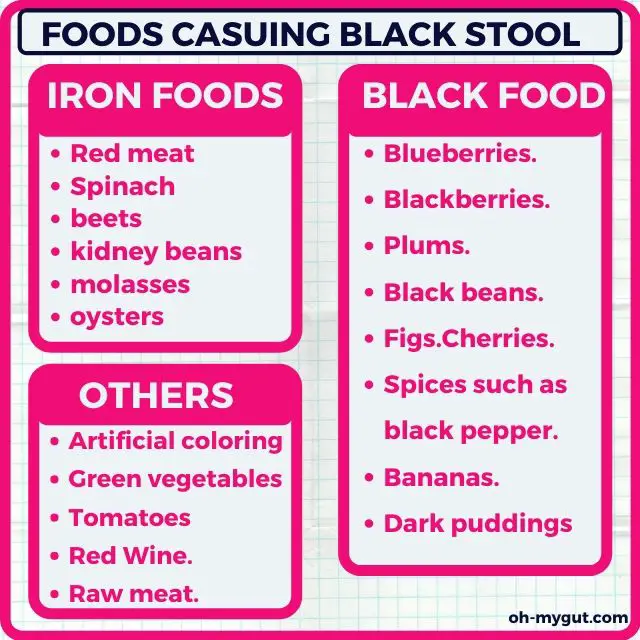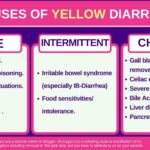Black Smelly Poop: 3 Main Causes & When to Worry.
Our content is not intended nor recommended as a substitute for medical advice by your doctor. Use for informational purposes only.
Quick Insights
1. Bleeding inside the gut tract (melena).
Bleeding inside the stomach, duodenum, or small intestine may cause smelly black poop. It is a common and serious condition.
Bleeding in the early parts of the gut tract (esophagus, stomach, and duodenum) often manifests as black (not red) stools due to the processing of the blood into a dark substance.
Causes:
The most common causes of gastrointestinal bleeding (with subsequent black smelly stool) include (reference):
- Peptic ulcers (55-74%): an ulcer in the stomach or the duodenum (the most common cause; responsible for more than two-thirds of the cases).
- Varices (5-14%): It is caused by bleeding from dilated esophageal or stomach veins. It is the most common cause of black stool in people with liver cell failure (liver cirrhosis).
- Vascular malformations (2-3%): Abnormally dilated or tortuous blood vessels in the wall of the stomach, duodenum, or any part of the gut tract that eventually bleed and cause smelly black poop.
- Benign or malignant tumors of the gut tract (such as stomach cancer): a tumor may ulcerate and bleed, causing offensive black poop.
- Others include Mallory-Weiss syndrome, Crohn’s disease, ulcerative colitis, diverticulosis, etc.
- Swallowed blood: sometimes, bleeding from the nose, gums, tonsils, or pharynx may cause repeated swallowing of blood (false gastrointestinal bleeding). Swallowed blood can cause smelly black stools (melena) if the bleeding amount is significant.

Symptoms:
The symptoms of gastrointestinal bleeding depend on the site of bleeding, the severity, and the cause.
The most common symptoms include:
- Acute onset of black offensive (smelly) loose stool.
- The color of the stool is often jet-black, and it has characteristic rotten meat or fish smell.
- Some people may also experience vomiting of blood (clotted, dark red).
- Abdominal pain (more in the upper central abdomen in people with peptic ulcer disease). However, abdominal pain may be absent (reference).
- Symptoms of the cause of bleeding include rapid heartbeats, dizziness, lightheadedness, shortness of breath, and fainting.
- Symptoms of anemia include severe pallor, extreme fatigue with minimal effort, dizziness, and headache.
- Symptoms of the cause:
- Peptic ulcer disease: epigastric pain that refers to the back, recurrent nausea, vomiting, and anorexia.
- Varices: is often associated with a history of chronic liver disease (liver cirrhosis) with ascites (swollen abdomen), swollen lower limbs, jaundice, etc.
- Vascular malformations often present with only the symptoms of bleeding (no pain).
- Tumors (especially cancer) present with weight loss, chronic abdominal pain, etc.
The table below will help you spot the differences between bleeding (melena) and other causes of smelly black stool.
| MELENA | OTHER CAUSES | |
|---|---|---|
| COLOR | Tarry or Jet black. | very dark brown, or almost black |
| SMELL | Characteristic foul smells (acidic and ironic smell) | usually no notable changes from your normal stool smell. |
| CONSISTENCY | Usually loose (Tar-like consistency) and sticky. | well-formed, non-sticky |
| FLUSHING | Difficult to flush it away. | Easy to flush |
| COURSE | Sudden onset, rapid deterioration. | Usually, the condition is intermittent stool discoloration (related to foods or drugs) over days or even months. |
| SYMPTOMS OF THE CAUSE | Epigastric pain (peptic ulcer), vomiting of blood (esophageal varices). Weight loss (gastric cancer, colon cancer). May not present. | History of taking block foods, iron supplements, or Pepto-Bismol. |
| SYMPTOMS OF BLEEDING | Usually present:►Dizziness, fainting, shortness of breath.►Fast heartbeats.►Pale, cool, clammy skin.►Collapse, and loss of consciousness in severe cases. | Absent. |
Jet-black smelly stools due to gastrointestinal bleeding are life-threatening conditions requiring emergency medical assistance. Call your doctor immediately if you think you have blood in the stool.
2. Dietary changes.
When you experience very dark brown stools (almost black) with no other symptoms, you should think of simple causes.
Food is the most common cause of stool color changes. Many foods can lead to very dark brown or black smelly stool.
The recent change in your stool color without other symptoms (especially abdominal pain) may indicate that food is the cause.
Common foods that cause very dark brown or almost black stool:
1- Black colored foods and fruits:
- Blueberries.
- Blackberries.
- Plums.
- Black beans.
- Figs.
- Cherries.
- Spices such as black pepper.
- Bananas.
- Dark puddings
2- Iron-containing foods
- Red meat,
- Spinach,
- Beets,
- kidney beans
- Molasses
- Oysters
3- Artificial coloring
- black licorice.
- Chocolate puddings.
4- Green leafy vegetables: once digested, they turn dark greenish-brown or black.
5- Tomatoes and tomato products.
6- Red wine.
7- Raw or undercooked meat: besides containing iron, it also contains some blood inside the meat fibers.

3. Medications & supplements
Many medications and supplements can cause smelly black stools.
Medications and supplements can cause black stool by one of two mechanisms:
- Black-staining of the stool.
- Induction of melena (gastrointestinal bleeding).
Examples include:
A. Black-colored medications and supplements:
- Oral Iron supplements: Especially those with high iron concentrations during the treatment of iron deficiency anemia.
- Pepto Bismol (Bismush subsalicylates): a medication used to treat diarrhea and H. Pylori. If you take Pepto Bismol for an attack of diarrhea, it will be the most likely cause of smelly black stools.
B. Medications that cause gastrointestinal bleeding:
- Asprin.
- Diclophenac.
- Ibuprofen (Advil®).
- Ketorolac.
- Naproxen.
- Indomethacin (Indocin®).
- Bood-thinning medications such as:
- Warfarin (Coumadin ®)
- Direct oral anticoagulants.
- Injection anti-coagulants: Such as unfractionated heparin and low molecular weight heparins.
- Clopidogrel (Plavix ®).
If you have a smelly black stool, it is vital to remember any history of taking one or more of the above medications in the past few days.
When to Worry (see a doctor)?
- Characteristic tarry, jet black stool (melena).
- Signs of blood loss (anemia): such as dizziness, shortness of breath, rapid heartbeats, collapse, pale, cold extremities, or even loss of consciousness.
- History of non-steroidal anti-inflammatory drugs or blood-thinning drugs (it is ok to have dark stool when taking Iron or Pepto-Bismol).
- Signs suspicious of malignancy include significant weight loss (more than 5% of body weight within a few months), anorexia, low-grade fever, unexplained abdominal pain, or blood in stool at age >50.
- Unexplained anemia.
- Family history of colon cancer or familial polyposis.
- Evidence-based
- Written by a doctor.

Related Posts:
- Clear Urine with Bubbles: 6 Main Causes & When to Worry
- Tea-colored Urine: 5 Main Causes & When to Worry
- Norovirus Poop Color Changes & When To Worry (GI…
- Bloated as Pregnant? 6 Main Causes & Treatments.
- 5 Main causes of abdominal pain and blood in the urine
- 5 Main Causes of Throwing up Feeling after Eating…





